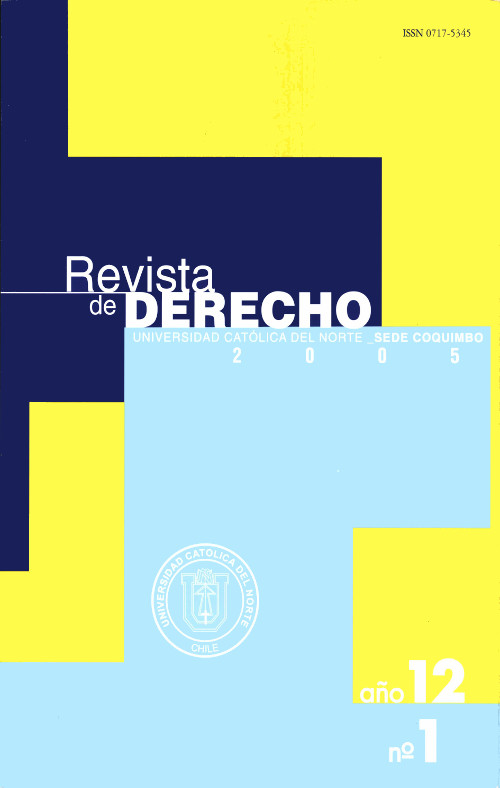Publicado 2005-06-30
Palabras clave
- Imperio del Derecho,
- Tribunales supremos,
- Pluralismo político,
- Interpretación del Derecho
Cómo citar
Resumen
Trátase en el presente artículo que la concentración absoluta del poder de interpretación jurídica en un tribunal supremo es un error, sobre todo en una época en que los propios jueces alrededor del mundo están cada vez menos convencidos de que el derecho sea ciencia más que política. Se sostiene que la alternativa al monismo no es necesariamente el desorden. En vez de eso puede ser el pluralismo jurídico. La interpretación oficial del derecho puede ser dividida o equilibrada más que consolidada o eliminada completamente. Equilibrando acertadamente la separación de poderes y el sistema de frenos y contrapesos es posible que no se brinde una solución de principio a la tensión que subyace en el ideal de imperio del derecho, pero se ofrecen alternativas prácticas a la elección entre tiranía y desorden.
Descargas
Referencias
Jacques DERRIDA: Of Grammatology, Gayacri Chakravorty Spivak trans, John Hopkins Press, Baltimore, 1976.
Catherine DRINKER BOWEN: The Lion and the Throne, Little, Brown and Company, Boston, 1956..
Thomas JEFFERSON: Carta a Abigail Adams , 8 Writings of Thomas Jefferson, Ford. Ed., 1897; en Paul BREST, Processes of Constitutional Decisionmaking, Little, Brown and Company, Boston, 1975.
William W. FISHER III et al: American Legal Realism, editado por, Oxford University Press, New York, 1993.
William Ray FORRESTER: Are we ready for Truth in Judging?, en American Bar Association Journal, N°63, 1977.
Mary Ann GLENDON: Comparative Legal Traditions, 2nd. Ed., editada por M.A. GLENDON et al., West Publishing Co., St. Paul, 1994.
H. L.A. HART: The Concept of Law, 2nd ed., Oxford University Press, 1994.
John HART ELY: Democracy and Distrust, Harvard University Press, 1980.
Mortimer R. KADISH y Sanford H. KADISH: Discretion to Disobey, Stanford University Press, 1973.
J. M . KELLY: A Short History of Western Legal Theory, Clarendon Press, Oxford; Oxford University Press, New York, 1992.
Sanford LEVINSON: Constitucional Faith, Princeton University Press, 1988.
Abraham LINCOLN: Messages and Papers of the Presidents, RICHARDSON ed., 1897; en Paul BREST, Processes of Constitutional Decisionmaking, Little, Brown and Company, Boston, 1975.
Jean-Francois LYOTARD : The Postmodern Condition: A Report on Knowledge, Geoff Bennington y Brian Massumi trans., University of Minnesota Press, 1979.
John Henry MERRYMAN: The Civil Law Tradition, 2nd ed., Stanford University Press, 1985.
F. L. MORTON, ''Judicial Review in France: A Comparative Analysis", American Journal of Comparative Law, N° 36, 1988.
Christopher NORRIS y Andrew BENJAMIN: What is Deconstruction?, St. Martin 's Press, New York, 1989.
Christopher OSAKWE: "Contemporary Soviet Criminal Law: An Analysis of the General Principles and Major Institutions of Post-1958 Soviet Criminal Law", Georgia Journal of International and Comparative Law, N° 6, 1976.
Edward A. PURCELL, Jr.: The Crisis of Democratic Theory, capítulos 5 y 9, University Press of Kentucky, 1973.
Richard STITH y J. H. H. WEILER: Dos visiones norteamericanas de la jurisdicción de la Unión Europea, Universidad de Santiago de Compostela, 2000.
Christopher WOLFE : The Rise of Modern Judicial Review, edición revisada, Rowman and Littlefield Publishers, Inc., Lanham, Maryland, 1994.
Louis HENKIN : "Revolutions and Constitutions", Louisiana Law Review, 1989.
Franz WIEACKER: "Foundations of European Legal Culture", traducida y concordada por Edgar Bodenheimer, en American ]ournal of Comparative Law, N° 38, 1990.
Hessel E. YUTEMA: "The Hornbook Merhod and the Conflict of Laws", Yale Law Journal, N° 37.

